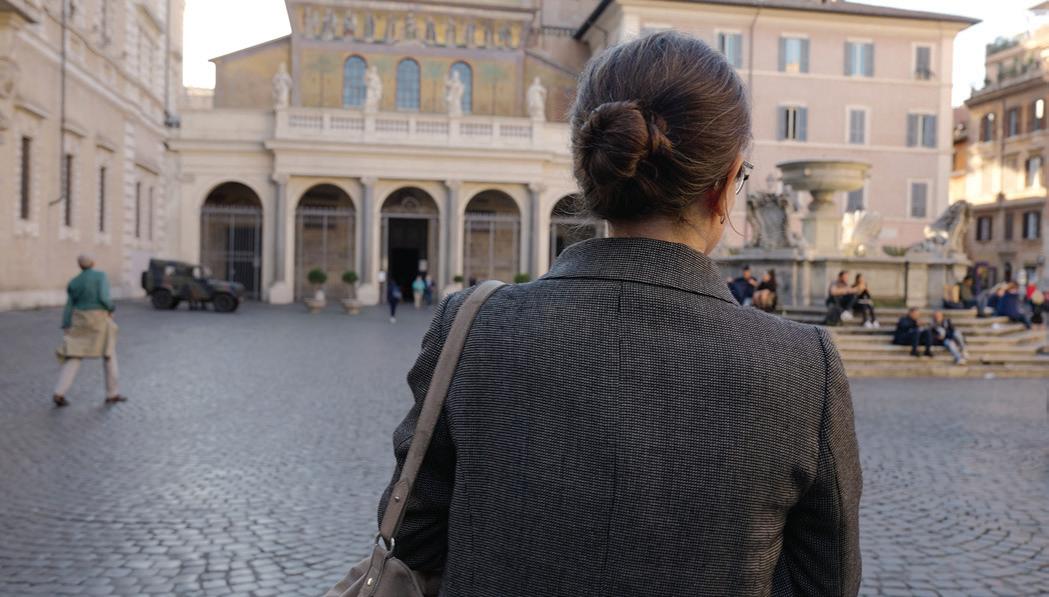


Guide Our Feet in the Way of Peace • A Culture of Encounter In Witness with One Another • Toward a Better Future • Is Anyone Listening? The Spirituality of Synodality • Hearth, Warmth, and the Holy Spirit This is What a Synodal Church Looks Like A PUBLICATION OF THE INTERCOMMUNITY PEACE & JUSTICE CENTER • NO. 141 • SPRING 2024
From the Editor
In March 2020, right as news of the coronavirus pandemic was gaining traction and we all started contemplating the possibility of a global shut-down, Pope Francis announced the topic of his next Synod of Bishops: synodality.
If the conversations you had with your communities was anything like mine, the reaction was something like: “Huh??” Followed closely by questions such as…Does the Vatican have to use so much jargon all the time? What does synodality even mean? What is this going to look like?
To be honest, the first year—or two—of the synod didn’t necessarily shed much light on these questions. Many of us went to parish or local listening sessions, where our answers to questions about the future of the church and our sense of belonging were listened to, recorded, and sent along to be incorporated into some nebulous report. Others showed up ready to share their experiences only to find that listening sessions had been cancelled due to lack of interest or scheduling mishaps. Regardless of people’s experiences—fruitful or frustrating, meaningful or rote—there seemed to be this sense that, OK, we did that. We shared our opinions. Now that’s done and it’s time for the church to listen (or not) and make change.
What has become obvious, four years later, is that Pope Francis wasn’t collecting all of our feedback like millions of Yelp reviews on the Catholic Church. Instead, he was teaching us a new way of being church together. In October 2023, Pope Francis gathered together 365 people—not only bishops, but also priests, women religious, and laypeople—to reflect and discern on where the Holy Spirit is leading the Catholic Church. The result of that gathering, for many of the participants and others in Rome during that time, was the idea of a new way of journeying together.
The articles in this issue of A Matter of Spirit show what this new way of being church looks like and how a diverse group of writers have been inspired by Pope Francis’ vision for the church. Each essay looks at the synod and a synodal church
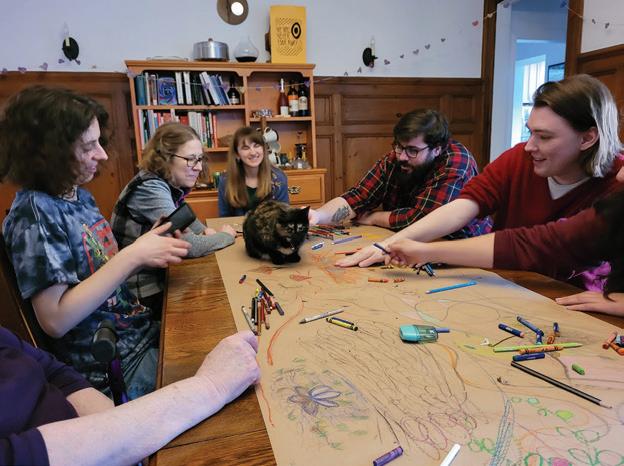
“The
“The articles in this issue show what this new way of being church looks like... ”
from a different perspective: in peacebuilding (Rhonda Miska), at a university (Mollie Clark), through an ecumenical lens (Christine Delp), in community organizing (Tim McManus and Surya Kalra), in a parish community (Janet McDermott), on a personal level (Sarah-Marie Chan), and in community with one another (Cassidy Klein).
While putting this issue together, a member of our editorial board commented that the topic seems different than many of our recent issues, which have centered around a single topic or action. And it is true that in many ways, an issue on synodality and a synodal church is broader than one on, say Black Catholics or Sacred Salmon. But on the other hand, synodality grounds the work we do, both at IPJC and in our individual communities. It affects how we relate to one another and how we understand our relationship with God and creation. As Pope Francis said, “The world in which we live, and which we are called to love and serve, even with its contradictions, demands that the Church strengthen cooperation in all areas of her mission. It is precisely this path of synodality which God expects of the Church of the third millennium.”
What does a synodal church look like? It looks like a art show (pages 4–5), a house meeting (pages 7–8), or even just people making a commitment to live together in intentional community (pages 12–13). It looks like the People of God, traveling together and listening to one another without personal or political agendas. It is a church I am excited to be part of.
—Emily Sanna, Editor
SPRING 2024 • NO. 141 2
Fireplace”, see article on page 12. Photo © Cassidy Klein
“Take just one side in this conflict: that of peace.”
—Pope Francis
Guide Our Feet in the Way of Peace
BY RHONDA MISKA
In Rome in October 2023, the heartfelt desire for peace was palpable. Violence had erupted in Israel and Gaza as the synod assembly was beginning, not to mention the many other places in the world marred by violence. As I processed by candlelight, praying the rosary through St. Peter’s Square with hundreds of other pilgrims on October 14, we were invited to pray to Nostra Signora della Pace, Our Lady of Peace. At the October 18 papal audience, Pope Francis announced a day of prayer and fasting for peace and urged believers to “take just one side in this conflict: that of peace.”
I was part of a Discerning Deacons pilgrimage delegation to Rome that sought to accompany synodal delegates. The prayerful, hopeful energy around synodality and the synodal assembly experience was palpable. One synod delegate I spoke to called the assembly a “ kairos moment,” and another told me that the “process is working!” As I savored the graces and reflected on my experience, I realized that the hope stirred by the synodal journey and the heartfelt longing for peace are fundamentally connected.


The Canticle of Zechariah (Luke 1:67–79), prayed daily by countless people around the world, includes the supplication, “guide our feet in the way of peace.” And the Adsumus prayer, well-known to many who are immersed in the work of synodality, implores the Holy Spirit to “teach us the way we must go and how we are to pursue it.”
As the people of God walk a shared synodal path, we have sought to embrace deep listening, bold speaking, shared silence, trust in the Holy Spirit, and a desire for communion. These are disciplines synodal delegates took on in October 2023 and will take on again this fall. But they are not just synodal disciplines; they are peacebuilding practices that “guide our feet in the way of peace” and illuminate the “way we must go.”
We are immersed in a toxic, oversaturated, polarized media world of oversimplified soundbites, sensationalized headlines, reductionistic tweets, and misleading clickbait. Social media algorithms feed us content that will titillate us, provoke our anger, and reinforce our assumptions. There is too much outrage and not enough silence. There are too many assumptions and not
1
©
3 A MATTER OF SPIRIT
Photo
Martino Pietropoli, unsplash
enough humility. There is too much righteous indignation and not enough curiosity. There is too much reactivity and not enough spacious generosity.
Shortly after I returned from Rome, a dear friend who is a Jewish faith leader lamented that discourse around the current violence in the Holy Land lacks nuance and minimizes the incredible complexity of the conflict. As I listened to her fear, hurt, and frustration, my heart was moved. I thought of the photos of hundreds of delegates from around the globe seated at round tables sharing spiritual conversations. I thought of the conversations our team facilitated among university students and shared among ourselves. These conversations create the kind of space for which my friend was longing. They strengthen our muscles for relationships across differences.
We are in desperate need of the countercultural example of synodality that is “salt and light” (Matt. 5:13–16) to a fractured world. Synodal practices, modeled by delegates sharing in spiritual conversation in the synod hall and in listening sessions throughout the world, encourage mutual listening and making room for the other.
“Why was I chosen to observe such a monumental moment of church history? How can I share this gift with others?”
A Culture of Encounter
BY MOLLIE CLARK
For me, synodality at its core is about encounter. Sharing my story is only effective if, in doing so, I invite the person with whom I am speaking to do the same. This experience of encounter has manifested itself in a multitude of ways.
Last October, I had the immense privilege of taking a pilgrimage to Rome to bear witness to the first part of the Universal Stage of the Synod on Synodality as part of a class devoted to the study of the synodal process and its place in our church today. In the weeks leading up to our departure, I was consumed by doubt. In prayer, I frequently asked God: “Why was I chosen to observe such a monumental moment of church history? How can I share this gift with others?” However, my time in Rome proved to be transformational.
In the words of a letter from the delegates released at the close of the assembly, “the Church’s vocation is to proclaim the Gospel not by focusing on itself, but by placing itself at the service of the infinite love with which God loved the world.” This echoes the vision of Gaudium et Spes (The Pastoral Constitution on the Church in the Modern World) that the church is to be leaven.
Pope Francis has called for Christians to be “artisans of peace.” This call is intrinsically related to Pope Francis’ challenge to become a listening church and embrace “this path of synodality which God expects of the Church of the third millennium,” to not only have a synod but to “be a synod.” As the people of God walk the synodal path, we are salt, light, and leaven for a world in need.
Rhonda Miska is a preacher, teacher, writer, lay ecclesial minister, and spiritual director currently serving in the Archdiocese of St. Paul-Minneapolis. She is a graduate of the Boston College School of Theology and Ministry, is active in Discerning Deacons, and writes regularly for print and digital Catholic publications.

My class had the opportunity to spend time with people who authentically embody synodality. This included voting synod delegates, members of Sant’Egidio, a volunteer organization that serves those on the margins, and representatives from Discerning Deacons and IPJC, who spent their time educating students about the application of synodality in the real world. Each interaction was imbued with the Holy Spirit, and every person imparted their own wisdom.
During our time with Discerning Deacons, we participated in a Conversation in the Spirit, voting members’ primary method of discernment. This experience enabled me to immerse myself in the deep, prayerful listening and discernment that are pillars of a church whose members truly journey together. In that moment, synodality became tangible to me. I finally had

2
SPRING 2024 • NO. 141 4
an answer to my previous concerns. Sharing what was in my heart and receiving the stories that poured out of others, under the guidance of the Holy Spirit, served as an example of “being church” in a spirit of radical inclusivity and love.
Just as the synod is an ongoing process, one that will not end in October 2024, so too are the diverse ways we are called to embody synodality. Human beings are fallible, and even as I try to work with my classmates to share our experience in Rome with the Fordham community and beyond, there are many stumbling blocks along the way. Doubt still creeps in. This is new territory, and while it is such a gift to have a role in “widening the tent,” even in a small way, there is still so much to learn and embrace. I’ve found that a meaningful way to bring synodality to campus life is to recognize that it is something meant to be lived, not simply a concept to be taught.
As a final project for our class, three other students and I organized a “synodal art gallery.” We commissioned students from Fordham and other institutions to create art that reflected their experiences with the divine and their hopes for the future of a synodal church. During campus events, we initiated conversations with students regarding the synod, particularly with those who were unfamiliar with the concept. We invited these students to reflect on their unique experiences with the church, both empowering and difficult. These individual encounters are the source and summit of my experience of synodality on Fordham’s campus.
The beauty of synodality is that it can be embodied in innumerable ways. This semester, in response to the Synod Office’s call to hear more voices from the U.S. church, I am collaborating with another student who journeyed to Rome to organize Conversations in the Spirit for members of the Fordham community. This would not be possible without the invaluable participation of students training to be facilitators, creating content for social media outreach, and participating in the dialogue itself, sharing their stories with the church and one another. The contribution of each person’s time, gifts, and voice has culminated in a genuine embodiment of a synodal church. Even before the Conversations in the Spirit unfold, synodality is breathing life into our community and, consequently, the church.

Mollie Clark is a sophomore at Fordham University majoring in English and theology with a concentration in American Catholic Studies. Since her return from witnessing the Synod on Synodality, she is passionate about bringing the concept of synodality to her fellow students in an accessible manner.


5 A MATTER OF SPIRIT
Images from the "synodal art gallery" organized by Fordham students. © Mollie Clark
In Witness with One Another
 BY CHRISTINE DELP
BY CHRISTINE DELP
“Why am I here? What is my part to play in the global synod of a church that I’m not even a part of?”
These questions were at the top of my mind as I lugged camera equipment up a steep hill in Rome, my back sweating in the sweltering mid-October heat.
It was October of 2021, and I was in Rome with my friend and colleague, Pilar Timpane, to document the opening events of the Synod on Synodality. For months, we had been following women in the United States and Latin America who were bringing forth the question of women and the diaconate, including women in leadership positions at various Catholic organizations.
I knew from Pilar, who is Catholic and directing the film I am producing, some of the history and context for this historic moment of the Catholic Church. But finally being in Rome— at the center of power for one of the world’s oldest and most powerful institutions—felt weightier and more intense than I had anticipated.
Here in Rome, I was documenting women as they shared their most intimate callings and fears. I was sleeping in a convent with a curfew, taking part in evening meals and prayer services, and accompanying these women to meetings with
important Vatican leadership. My job was to point a camera at these women during both mundane and vulnerable moments and constantly ask, “How do you feel about this major moment not just in your life but in the history of the Catholic Church, which you may or may not want to talk about right now as I interrupt your prayer time?” (At least that’s how it went in my head. Out loud it sounded more like, “So what has this process been like for you?”)
As both a documentary filmmaker and a doctoral candidate in sociology researching ethics in the documentary industry, I am hyperaware of the care for participants that this work demands. In Rome, I was constantly afraid of overstepping, of being a nag or—worst case scenario—a harm to these women’s faith journeys. These worries were made more salient by the fact that as a non-Catholic, a Methodist who hasn’t regularly been to church in years, I was an outsider to this faith community.
But it was at the top of that Roman hill, in a sun-streaked cafe on the sidewalk of a quiet street, that I was given a sign that perhaps I was supposed to be here, on a synodal journey with these women.
As Pilar and I put our lens caps on our cameras after a brief interview, Lisa Amman, deputy director of engagement for Discerning Deacons, offered these words: “You know, doing these interviews feels like an incredibly valuable mystagogia of my experience participating in the synod.”
After I got clarification on what mystagogia meant, she continued: “You create more public space in this synod for a group of women to share their thoughts and feelings about their role in the church. It feels like a kind of rarified air, to not be doing this work in private. You are giving us more opportunities to
3
SPRING 2024 • NO. 141 6
offer our witness in service to the church in public. I feel like it is inviting us to walk in a synodal path.”
Her words took my breath away.
I have often understood my experience with religion perhaps unconventionally, joking that I am “religious but not spiritual.” As a producer, social scientist, and (more often than I would like to admit) pragmatist, often the internal, personal, spiritual part of faith—such as prayer—is difficult for me.
But the external, shared, communal experience of documenting other people’s faith in religious communities has consistently made me feel closest to God. With Lisa’s words, this was the first
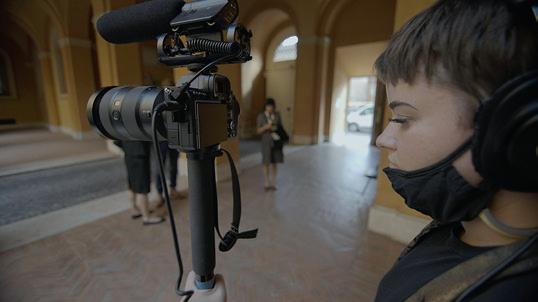
Toward a Better Future
BY TIM MCMANUS AND SURYA KALRA
Itime I had ever understood that perhaps sharing one’s story in a documentary could also feel like a spiritual experience.
I will never pretend that there is not an unequal power dynamic between myself as a documentarian and those whom who I am documenting. The care and need to think critically about my position as a documentary filmmaker with participants—especially when I am an outsider—is ever present and complicated. But Lisa’s words reminded me of the beauty and holiness of the exchange; that witnessing and being witnessed to could be a spiritual experience for those of us on both sides of the camera, in community with one another. I didn’t have to feel like an outsider in this church, because God had a role for me here, too.
What is more synodal than that?
For more information about the QUERIDA documentary, visit wmm.com/sponsored-project/querida-working-title
Christine Delp is a documentary filmmaker and a doctoral candidate in sociology at the University of Minnesota, where she holds a National Science Foundation fellowship. Her work has been supported by Sundance Institute, Tribeca Film Institute, Field of Vision, and others and has been broadcast internationally on platforms such as HBO, PBS, and Al Jazeera. For more information, please visit falconparkpictures.com
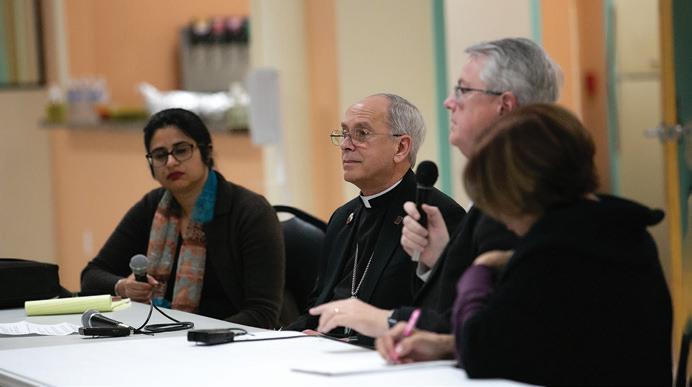
n 2018, the West/Southwest region of the Industrial Areas Foundation (IAF) launched an ambitious project to partner with local dioceses in the development of lay leaders, particularly immigrants and those on the margins. To date, this strategy, called “Recognizing the Stranger,” has involved 21 dioceses and trained 5,000 lay leaders in the habits and practices that lead to listening, conversation, and building bridges that bring Catholic teaching more fully into public life.
Many bishops, including Bishop Mark Seitz of El Paso, Texas, and Bishop Daniel Garcia of Monterey, California, recognized the connection between this initiative and Pope
Francis’ global synod process and invited us to partner with them. In each instance, IAF worked closely with the bishop and synod coordinators to prepare parish leaders to conduct robust, face-to-face synod listening sessions.
Historically, community organizing has been rooted in the belief in the capacity of people to come together in action that moves their communities closer to a common good. This involves thousands of conversations about what is happening in a community and what is to be done, and it requires a space for this process to unfold. Through parish organizing, IAF leaders and organizers have learned to patiently and with commitment engage in careful listening to create the type of
Article photos courtesy of Surya
Kalra
4
Above: A behind-the-scenes photo of Christine Delp filming a documentary in Rome during the Synod on Synodality. Page 6: Casey Stanton of Discerning Deacons appears in a still from Christine Delp's upcoming documentary.
7 A MATTER OF SPIRIT
“When you take responsibility for a situation, it touches your heart, and you must move forward.”
—Pope Francis

IAF members host parish listening groups to help people
engage more deeply in the synodal process.
“productive tension” to which Pope Francis has called the church. This allows us to walk together toward a better future.
To support the synod process, we taught parishioners to build a diverse, strong team of leaders from different ministries, Masses, and demographics. These teams connected with people from the many different sectors of a parish, moving beyond the already engaged and active leadership and reaching the peripheries. This made it possible for larger participation in the synod, not just from within a parish but also from those feeling disconnected from the church.
The next phase of training involved learning to lead synod conversations. In organizing, we refer to similar small group conversations as “house meetings.” While house meetings (which can take place anywhere, not just in someone’s home) help surface concerns in a community, their real worth is in creating a space for future leaders to emerge. As people discuss what is happening around them, those who want to make change step forward. As we trained teams to actively listen and guide people through the synod questions, we taught them how to look for people interested in acting on their concerns. Finally, we stressed the importance of evaluation. We asked teams to reflect on how the process went, what they learned, and especially who emerged as leaders through their conversations.
Experienced leaders from our local organizations also benefited from participation in the synod. They gained a deeper appreciation for the church and began to integrate organizing into their faith experience. In the Monterey Diocese, two Spanishspeaking Catholic immigrant leaders—Maricela Acevedo from King City and Adriana Molina from Castroville—began
to engage more deeply in their local parish after helping with synod training. They built working relationships with their pastors, became involved in leadership at the parish level, and eventually got their parishes formally involved in community organizing.
In many dioceses, the synod sessions led to concrete local action. At Christ the Savior Catholic Church in El Paso, young people, who felt they had no voice or space in the church, joined with caring adults to form a youth ministry program. A team developed at the parish and began reaching out to parents of children in the religious education program and are now forging relationships with local schools to address mental health concerns.
In October 2022, 20 IAF leaders and organizers were invited to visit with Pope Francis in his residence so he could learn more about this work. When we shared what we had done, Pope Francis said, “Cuando escucho me hago cargo. Cuando vos te haces cargo de una situación, te toca el corazón y tienes que ir adelante.” (“When you listen, you take responsibility. When you take responsibility for a situation, it touches your heart, and you must move forward.”) As we continue both the synodal listening process and the day-to-day work of organizing, Pope Francis’ words resonate deeply and compel us to keep walking together.
Tim McManus is a Senior IAF Organizer based in Dallas, working with IAF organizations in North Texas, Arizona, and the Central Valley of California. Surya Kalra is the IAF Lead Organizer with EPISO/Border Interfaith in El Paso, Texas.
SPRING 2024 • NO. 141 8
Article photos courtesy of Surya Kalra
Is Anyone Listening?
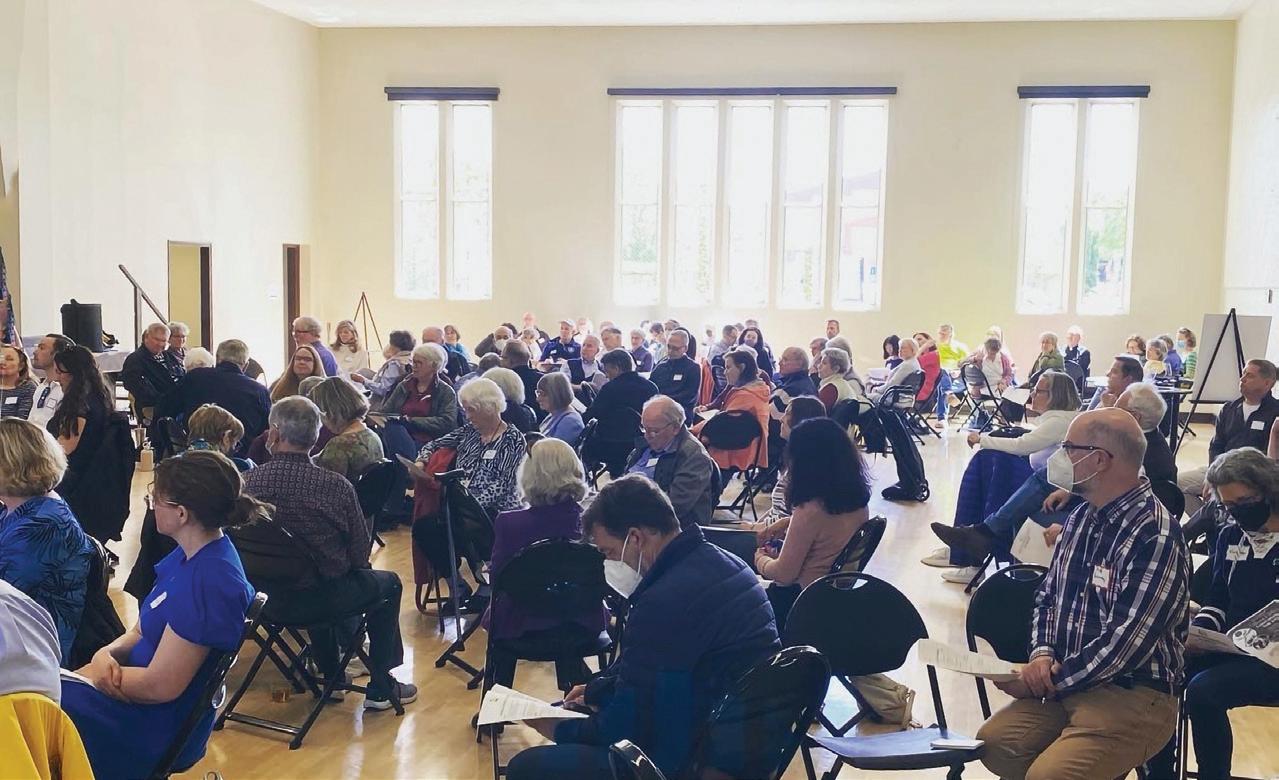 BY JANET MCDERMOTT
BY JANET MCDERMOTT
Iconsider myself blessed with a unique perspective on the movements toward synodality. I was taught as a child to count my sins during frequent Confession and receive Holy Communion on my tongue. Reading the Bible and understanding matters of faith were reserved for authorities. Then, in my late teens and early 20s, I heard about the Second Vatican Council, which took place while I was in college.
Later, as my young family grew, a new archbishop was appointed to lead Seattle: Archbishop Hunthausen. A recent member of Vatican II, he opened the church of Western Washington to all of us. We became participating members and grew a new community. Mass was now in English. Laypeople served. The Eucharist was offered as bread and wine. Adult baptisms, once private, became the Rite of Christian Initiation, a rich and personal way of introducing folks into our community. Bishops led protests against nuclear weapons and unrest in Central America. The LGBTQ+ community had its own Sunday Mass at St Joe’s. Laypeople with ministerial hopes enrolled in Seattle University’s School of Theology and Ministry.
Perhaps that’s why, when contemplating the synodal process, I leapt too easily into the question, “What impact did the synodal process have on how we at St. Joseph Parish move forward as a community?” I recalled the awesome scene of dozens of tables filled with my fellow parishioners, gathered into what I could describe as categories of concern (women’s ministry, young adults, liturgy, outreach toward disabled people, etc.). As I
“Our church has asked us to bring the Holy Spirit to the conversation.”
moved from table to table, I heard people who really care about one another and how we image “church” to the world.
Later I read the summary of our synodal gathering’s hopes and concerns that was sent to the archdiocese. I observed a noteworthy desire for inclusiveness among those in LGBTQ+ relationships, divorced Catholics, youth, migrants, and those who have turned away from our church family. People desired that the church do as Jesus did. I talked with others who had been a part of our synodal gathering. They also felt the same joy at the sight of all of us gathered, but many struggled to hope as well. There was a desire to know what would happen to our thoughts and concerns and a feeling of, “I spoke, but how will I know that someone was listening?”
I came to realize that there is another way to reflect on the current synodal process, which is occurring during a time of great discord. This discord has, unfortunately, seeped into the leadership of some U.S. bishops. Yet here I am, writing about the impact of Pope Francis’ call to listen to each and every one of us. The thoughts, hopes, and visions of members of St. Joseph Parish—of all churches throughout the world—are being collected, prayed upon, and, I suppose, debated, in Rome, a city far from Seattle.
Our church has asked us to bring the Holy Spirit to the conversation. The Holy Spirit is active in each of us—bishops,
Article photos with permission of St. Joseph Parish, Seattle 5 9 A MATTER OF SPIRIT
clergy, theologians, and, yes, in you and me. Discord or not, the church will be on its knees, asking for guidance on ways to be church in our times.
There are many of us “old folks” still around who have seen what inclusiveness can mean. We recall the ensuing years as well: a period of denial and pushback, as clericalism began to shave away at the promise of Vatican II. This pushback has brought confusion and sadness, challenging the brightness of our visions, yet—and this is important—we have not lost hope. In our hearts we recognize with deep joy that, once again, the Spirit is bringing new life to our church. We remind ourselves that the church, the body of Christ, is God’s project, not ours.
I find myself wondering how the insights and inspirations of our parish members can emerge as a new way to gather and be a community. I am concerned that the people with whom I worship might lose interest and opt out of this spring’s synodal gathering. I thank God for my faith journey and that I am a member of the team who brought us to this day. Locally, my hope is that our archdiocese models church by being a boldly inclusive and responsive community, witnessing God’s love in the world.
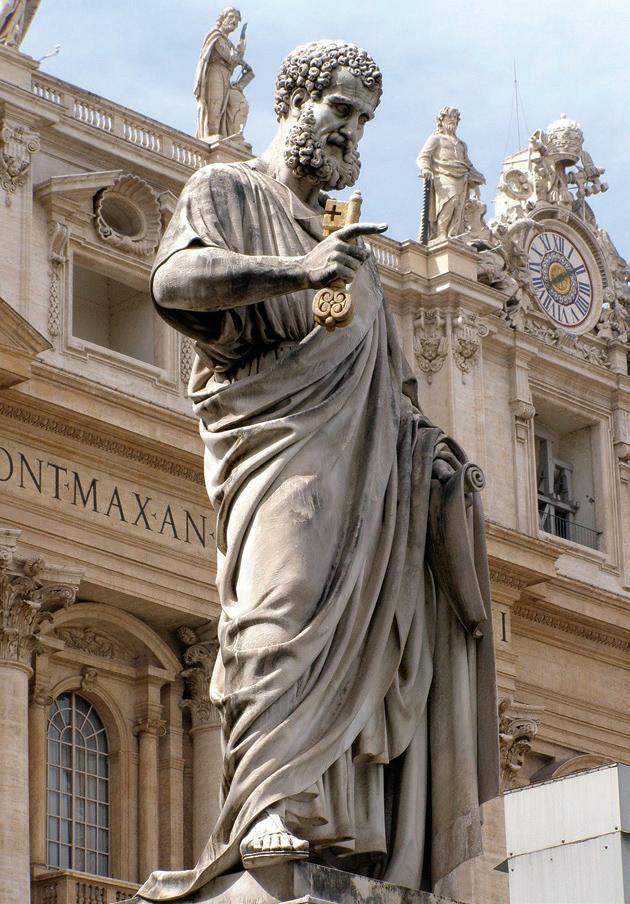
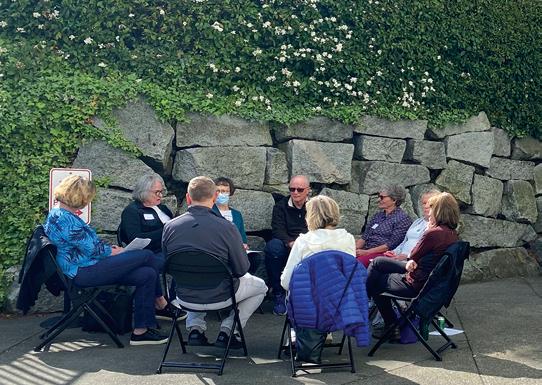
Janet McDermott is a cradle Catholic who was radically revitalized in her faith by the outcomes of Vatican II. Inspired by that Council, at age 50, she reenrolled in college and earned a masters in transforming spirituality. She is currently a member of St. Joseph’s Parish in Seattle, where she advocates for respectful inclusion within the church and for responsible care of the environment.
The Spirituality 6
BY SARAH-MARIE CHAN
When I arrived in Rome in October 2023, towering marble statues—of St. Peter, Moses, and St. Teresa of Ávila—jarred me into a state of cognitive dissonance. I had spent the last two years responding to the synodal invitation to listen to journeys of faith, bearing in me and in my communities the seeds of trust, healing, and common mission. But the commanding and unyielding nature of the statues bore instead the warning of the Holy Roman Empire: follow our rules and be weary of hell.
There can be good intentions in this unyielding message; instilling the fear of God might suppress oppressive powers. But this came with unfortunate side effects: the generations that raised me lived a spirituality formed by the fear of accidentally opposing God. Now, however, Pope Francis offers a more nuanced spirituality. I hope that in forming ourselves in synodality, Catholics might release ourselves of the shiver brought on by these imposing forms and consider instead: How did the saints depicted in these statues actually lead?
For 22 working days, delegates at the Synod on Synodality assembly shared their experiences in roundtables. Called “Conversations in the Spirit,” these sessions were designed to foster individual sharing, silent prayer, and communal reflection of the Holy Spirit’s movements. A bishop from Europe reflected,
Photo credit tc
SPRING 2024 • NO. 141 10
“In my diocese we feel like we are the center of the world. This was an experience of internationality. We enlarged our tent, and we ran out of tissues for our tent!”
The same bishop said this assembly was the first time he was able to truly listen to others’ experiences. In most meetings where a bishop is present, he is expected to lecture on direction and leadership. It is hard to simultaneously deeply understand an audience and present opinions to them. I believe that instilling this skill is the pope’s practical challenge: How might we develop leaders who understand their people?
Too frequently Catholics have misused this synod as a platform to bicker about politically charged issues. While in Rome, papal secrecy protected the delegates’ conversations, resulting in an unusual freedom and psychological safety for people in power. Delegates were able to accompany others in a way that I had already begun to practice as a lay volunteer for the synod in the Archdiocese of Seattle.
“How are all the baptized journeying in their faith?” This question began each Conversation in the Spirit and invited participants to hold space for other spiritual experiences. As a synthesizer of the report for the Archdiocese of Seattle, I learned to rapidly receive people’s vulnerable stories and experiences of
of Synodality
“ I dove into the wounds of my new friends’ stories as if they were my own....”
God. I learned to provide silence and empathy without dipping into sympathy, to address questions with questions when I had no answers, and to prayerfully seek God’s consolation along the way. I dove into the wounds of my new friends’ stories as if they were my own, finding myself uncomfortable as I challenged my understandings, sought greater perspective, and encountered an ever-growing variety of people.
Like me, the official delegates experienced ill-formed opinions that were replaced by shattered assumptions and rebuilt their understandings with nuance and compassion. The spirit of synodality began to open me to discover God’s presence in every person I met; likewise, the delegates began to recognize the commonalities and love that binds us together.
For synodality to transform from an invitation to a practice to, ultimately, a spirituality, one must continually be formed in it. This is part of why Pope Francis expanded the Synod on Synodality into a three-year process, which will conclude with one more assembly in October of this year. I’ve been surprised that the
spirituality of synodality is not terminal: it continually provides us with more clarity and nuance. As I listened to those with stories to share, sharing almost no words myself, I found myself shocked to hear others say, “Can I share your message with my family?” I said “Of course,” and left wondering, “What message?”
At the conclusion of the first assembly in Rome, delegates began to recognize that listening-first leadership had heightened the experience of God’s love for themselves and for their communities. As the delegates prepare to return to Rome for the second assembly, let us invite God ever more deeply into our consciences as we seek proper discernment through one another, together. The next time we see those marble statues, let us see the spirituality of synodality that our powerful saint leaders lived: the ever-deepening desire to understand God’s presence in their people.
Sarah-Marie Chan founded The Accompaniment Project, a consultancy providing practical experiences of spiritual accompaniment using leadership, management, and design thinking tools. Trained in product design at Stanford, Sarah-Marie has led teams to launch programs, medical devices, and software products. She lives in Seattle and is a member of Catholic Leaders Circle at Leadership Roundtable.

Article photos © of the author.
11 A MATTER OF SPIRIT
Statues of St. Peter, Moses, and St. Teresa of Ávila in Rome inspired Sarah-Marie Chan's understanding of synodal leadership.
Hearth, Warmth, and the Holy Spirit
BY CASSIDY KLEIN
“Everybody wants a revolution, but nobody wants to do the dishes.”
—Dorothy Day
Each year, around late May, the intentional community where I live, The Fireplace, throws a Pentecost party. In the late afternoon, we start a bonfire in our Chicago backyard, fill our kitchen with snacks and treats, and begin a lay-led liturgy celebrating community and the presence of the Holy Spirit in our lives. We play music, read poems, and break open a loaf of bread. Our neighbors stop by, and friends come in and out. Last year after the liturgy, we used our back deck as a stage and held an open mic. The bonfire burned until well past dusk as people lingered, and a few bright stars poked through the city lights. My clothes smelled like a campfire.
There are seven of us who live at The Fireplace—two Franciscan Catholic Sisters and four laywomen. We also have many nonresident friends and neighbors who are part of our community.
We have a community prayer that we pray before house meetings that we adapted from the USCCB’s official prayer for the synod. One of the lines is: “Teach us the way we must go and how we are to pursue it.” This prayer resonated with us because we are still figuring out who we are as a community, but like the church is doing with the synod, we know that we want to listen to the Spirit and respond to it with authenticity and trust in one another. Pentecost means a lot to us because the name and theme of The Fireplace is centered around fire: hearth, warmth, and the Holy Spirit.
The Fireplace is a community and refuge for artists, activists, and spiritual seekers. We are heavily rooted in and influenced by the Catholic tradition, but not everyone identifies as Catholic. We have community dinners and prayer twice a week and events a few times a month, such as collage and craft nights or Taizé prayer. The Fireplace is an intergenerational space where friars in their habits can casually talk around a fire with young adults who have little or no connection to organized religion. Even our extroverted tortoiseshell cat, Ember, knows about hospitality—she’s the first to greet people at the door whenever the doorbell rings.
We live in a big, turn-of-the-century house that has lots of cozy communal space, house plants, art, and furniture donated from closed convents. We rent our house from an order of
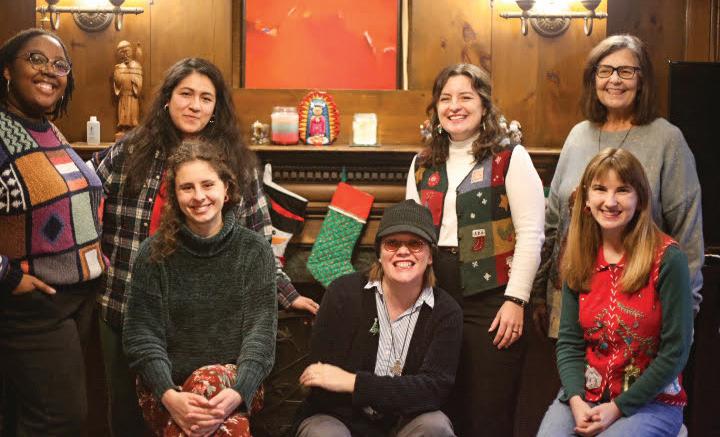
priests. Our community turned three years old in 2024, and being so new, we are in the thick of strategic planning, visioning, and long-term planning for how to remain sustainable for years to come. Sister Julia, my community mate, received a grant from her Franciscan Sisters of Perpetual Adoration (FSPA) community to start The Fireplace, and we are working to become financially independent and self-governing.
Intentional communities vary in practice, but all are modeled around people sharing life together around a common mission or values. At The Fireplace, we seek to respond to the “epidemic of loneliness and isolation,” which the U.S. surgeon general has called a public health crisis, with community. We also seek to prevent burnout, especially among artists and activists.
In the story of Pentecost, the Holy Spirit, through wind and fire, descends on the apostles and other early Christians as they were gathered in an upper room of a home. Some residents and friends of The Fireplace are people who have been harmed by, or have a difficult relationship with, the church tradition in which they grew up—Catholic, evangelical Protestant, LDS, or otherwise. There are many deconstructing or disillusioned spiritual seekers who are finding their way and figuring out what faith means to them. As a community, we center the liturgical leadership of women and LGBTQ+ people. We’ve been told that The Fireplace is “church” for many people.
“Everybody wants a revolution, but nobody wants to do the dishes,” says a Dorothy Day quote that’s taped above our sink, written in purple marker. Intentional community is about the ideal, “fun” stuff—mission and hospitality—but it’s also about nitty-gritty practical things, like creating a budget on a Monday night, voting about governance structures at house meetings, and doing dishes—so many dishes. Living in community, I do give up some privacy and a certain level of independence. I also learn, in a microcosm of a way, what loving my neighbor and interdependence really demand of me on a specific, down-to-earth level.
There’s a Dietrich Bonhoeffer quote that says, “The person who loves their dream of community will destroy community, but the person who loves those around them will create community.”
7 SPRING 2024 • NO. 141 12

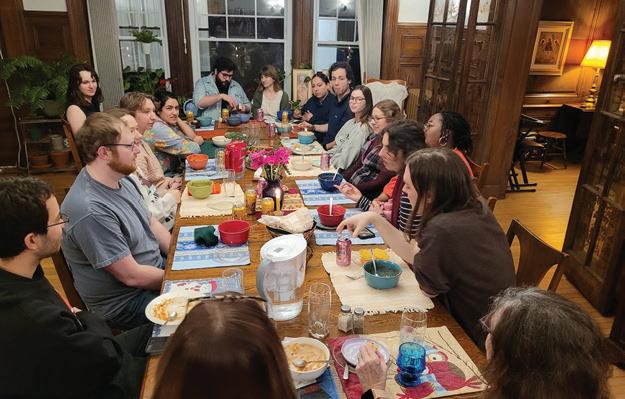

As The Fireplace moves into the next stages and years of our existence, we have to stay grounded in why we do what we do, and that, always, is loving the people around us, our neighbors, those who seek belonging. We can’t get too caught up in differing visions or ideals of what we should be, and I think this is also true for the institutional church. We have to always meet people where they are and not impose an ideal on them.
When someone finds a sense of belonging at The Fireplace, I remember why we do what we do, even when it’s hard and messy. The Holy Spirit is with us, helping us build this new and chaotic thing, this alive and welcoming “church.”
Cassidy Klein (she/her) is a writer and journalist living in Chicago.
Article photos © of the
13 A MATTER OF SPIRIT
Members of the Fireplace, accompanied by their cat, Ember, live together in an intentional community and regularly host dinners, prayer, and other events for the larger community.
author


Reflection
In Mary, we learn how to travel as a synodal Church. We learn to be at home in the world and to make a home for all those who are seeking home, a place of welcome and refuge, healing and salvation, a place of reconciliation, peace and the assurance of eternal life. This is a Church for which we long and need. At some point, we all become refugees seeking a homeland. With Mary, Mother of the Church, we learn how to make the Church, the Body of Christ, such a place, a people of living communion, participation and mission.
With her, we learn to say our “fiat” in all the circumstances of our lives and to join in the great chorus of faith that echoes through the centuries, “Magnificat anima mea dominum”— “My soul glorifies the Lord, and my spirit rejoices in God my saviour.” So long as that chorus never fades, the world has a sure hope; if it follows the great song, it will find its way to the inestimable gift of life who is Jesus Christ.
“TOWARDS A SPIRITUALITY FOR SYNODALITY”
Questions for reflection
1. Has your experience with the synod and the synodal process changed how you experience the body of Christ? How so?
2. What does it mean to you to “travel as a synodal church”?
3. What people or models help you more deeply understand what it means to be a synodal church?
4. What does a synodal church look like to you?
5. As your understanding of a synodal church has deepened, do you feel called to do anything differently in either your faith communities or own personal spirituality? How so?
A LOOK BACK
Northwest Ignatian Advocacy Summit in February 2024
A beautiful, powerful, and multigenerational gathering culminated in the Sacred Salmon Town Hall public action! Representatives from Jesuits West-sponsored works in the Northwest gathered to learn and take action to restore salmon and honor tribal treaties.
(photo top right: participants engaging in a workshop activity)
“I Will Live Until I Die”
Over 650 community members attended two community-centered musical shows featuring local Seattle choirs and actors, all led by the creative vision, direction, and acting of ValLimar Jansen. Both evenings were a cultural celebration highlighting the gifts and struggles of Black Catholics as told through the prophetic life and ministry of Sister Thea Bowman.
(photo middle right)
Peace In Israel & Palestine
IPJC’s Youth Action Team interns, along with a coalition of their peers, hosted an educational evening at Our Lady of the Lake featuring Jim Thomas, Deacon Denny Duffell, and a student panel. A few weeks later, they gathered people on Good Friday to walk “The Way of Sorrow,” drawing parallels between Hamas’ acts of terrorism on October 7, the Israeli government’s ongoing genocide of Palestinians, and the passion of Jesus.
(photo lower right)
TAKE ACTION FOR PEACE WITH THEM HERE!
bit.ly/3xmhCiQ
Photo of the Sr. Thea Bowman Musical used with permission; Other images IPJC
SPRING 2024 • NO. 141 14
Virgin Mary of Guadalupe, mosaic © Grant Whitty, unsplash

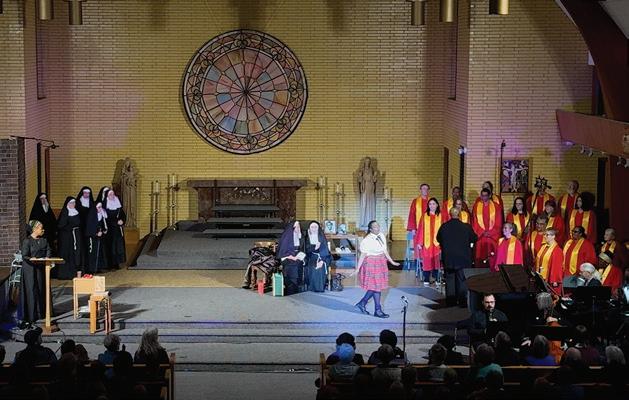

UPCOMING EVENTS
Discerning Diakonia: A Prophetic Diaconate for a Co-Responsible Church April 29, 2024 from 1–3 p.m. PST via Zoom
IPJC is excited to be a participating organization in this powerful gathering as we continue to walk forward on the pathway of synodality and transforming women’s leadership in the church.

REGISTER HERE: bit.ly/discerningdiakonia
Rise Together, May 3!
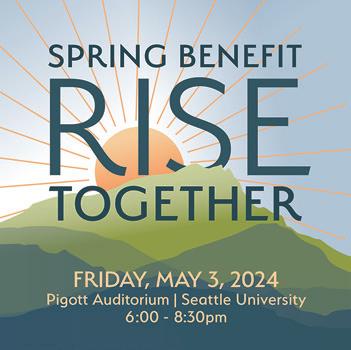
Join the Intercommunity Peace & Justice Center to celebrate IPJC and honor the Tacoma Dominicans! Get your tickets here: bit.ly/3PxXnVF
Donations
IN HONOR OF
Marikay Bates, Judy Byron, OP
Linda Haydock, SNJM, Sr. Lucinda Peighthal, SNJM
Tacoma Dominicans
IN MEMORY OF
Helen Brennan, OP, Louise McDonald, CSJ
Mary Pat Murphy, OP, Peg Murphy, OP
YATI interns walk with over 80 participants in The Way of Sorrows Good Friday stations of the cross in Seattle.
15 A MATTER OF SPIRIT
Intercommunity Peace & Justice Center 1216 NE 65th St Seattle, WA 98115-6724
SPONSORING COMMUNITIES
Adrian Dominican Sisters
Congregation of the Sisters of St. Joseph of Peace
Jesuits West
Sisters of the Holy Names of Jesus and Mary, U.S.-Ontario Province
Sisters of Providence, Mother Joseph Province
Sisters of St. Francis of Philadelphia
Tacoma Dominicans
AFFILIATE COMMUNITIES
Benedictine Sisters of Cottonwood, Idaho
Benedictine Sisters of Lacey
Benedictine Sisters of Mt. Angel
Dominican Sisters of Mission San Jose
Dominican Sisters of Racine
Dominican Sisters of San Rafael
Sinsinawa Dominicans
Sisters of Charity of the Blessed Virgin Mary
Sisters of St. Francis of Redwood City
Sisters of St. Joseph of Carondelet
Sisters of St. Mary of Oregon
Society of the Holy Child Jesus
Sisters of the Holy Family
Sisters of the Presentation, San Francisco
Society of Helpers
Society of the Sacred Heart
Ursuline Sisters of the Roman Union
EDITORIAL BOARD
Don Clemmer
Kelly Hickman
Nick Mele
Andrea Mendoza
Will Rutt
Editor: Emily Sanna
Copy Editor: Elizabeth Bayardi, Carl Elsik
Design: Sheila Edwards
A Matter of Spirit is a quarterly publication of the Intercommunity Peace & Justice Center, a 501(c)3 nonprofit organization, Federal Tax ID# 94-3083964. All donations are tax-deductible within the guidelines of U.S. law. To make a matching corporate gift, a gift of stocks, bonds, or other securities please call (206) 223-1138. Printed on FSC® certified paper made from 30% post-consumer waste.
Cover: Casey Stanton of Discerning Deacons in Rome during the synod, photo © Christine Delp, see article page 6; detail from the "synodal art gallery" organized by Fordham students. © Mollie Clark, see article page 4
Back Cover: Photo © Martino Pietropoli, unsplash. ipjc@ipjc.org • ipjc.org
Embracing life as it comes
Jesus, we see you in the Gospels welcoming everyone who was close to you, like the man with evil spirits or the man with the withered hand.
We see You walking with the disciples of Emmaus or giving comfort to the widow who has lost her only child.
You taught us to embrace life as it comes, to focus on people, no matter who they are or what they have experienced.
Give us your grace and your light to imprint “your style” in the Church, to understand the others as they are to understand them from the depths of their hearts beyond their words and actions.
May we be an open-hearted Church, a Church that is receptive and walks with others.
Amen.


—PRAYFORTHESYNOD.VA NON-PROFIT ORG. US POSTAGE PAID SEATTLE, WA PERMIT NO. 4711












 BY CHRISTINE DELP
BY CHRISTINE DELP



 BY JANET MCDERMOTT
BY JANET MCDERMOTT















